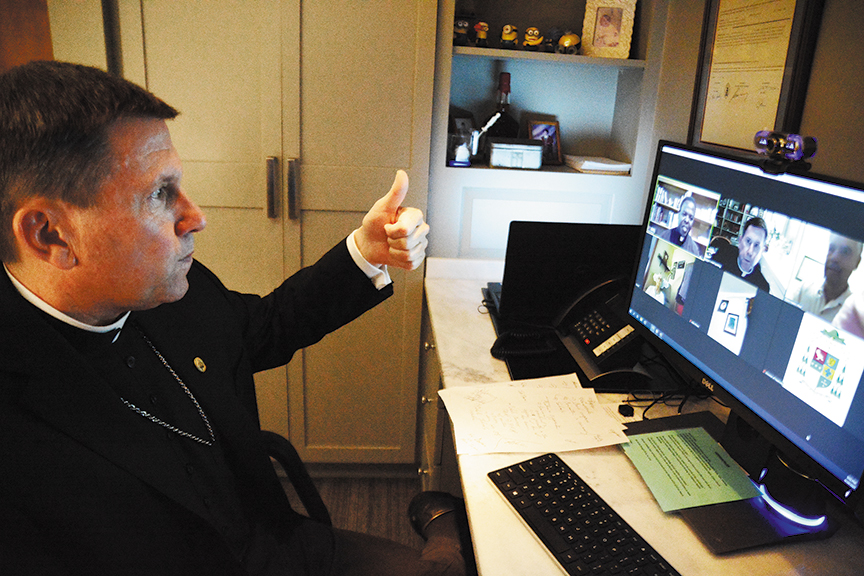
The COVID-19 pandemic trimmed one of a bishop’s most important responsibilities, connecting with the people of his diocese.
Normally, Bishop J. Mark Spalding would make those connections on visits to the Diocese of Nashville’s 59 church communities. Those visits were sharply curtailed to avoid putting people in danger of contracting the coronavirus.
But the bishop found a way around the hurdle by scheduling online meetings with pastors and parish representatives of the Diocese of Nashville’s 59 church communities.
“The key thing for a bishop is to connect and communicate with the people,” Bishop Spalding said.
During the course of the pandemic, the bishop, like people across the country, was using Zoom calls to conduct meetings. “I thought of using Zoom to connect with the parishes,” he said.
Beginning in late November 2020, Bishop Spalding has been meeting online with each of the parishes in the diocese, starting with Immaculate Conception Church in Clarksville and finishing with St. Elizabeth Ann Seton in Tennessee Ridge on Wednesday, June 29.
“It’s taken six months or so to get to all the parishes,” Bishop Spalding said. Because the bishop had to coordinate his schedule with that of the pastors and parish representatives, “it took that long to make it all happen,” he said.
“Overwhelmingly, people know how the technology works,” having used it for business meetings at their jobs or to stay in contact with family, Bishop Spalding said. And when there were glitches with the technology, he added, “we all had a good spirit about it.”
Invited to participate in the meetings with the bishop were the pastor, the parish council members, the parish finance council members, and if there was a parish school, the school board.
Each meeting had a similar agenda.
“First thing, I sort of go through the past year,” said Bishop Spalding, who made a point to thank each pastor “for their courage and creativity” in getting through the obstacles of the past year, which was highlighted by tornados, floods, a Christmas Day bombing in downtown Nashville, protests against racism, a bitter presidential campaign, and the pandemic.
He also talked about the accomplishments of the diocese in several areas. The Vocations Office has done good work helping the diocese’s 20 seminarians in formation, with several more scheduled to begin their seminary studies in the fall, Bishop Spalding said.
The Vocations Office has also overseen the formation of a class of permanent deacon candidates as they moved closer to their ordination scheduled for 2023, while also organizing a new class of deacon candidates that will begin in August, the bishop added.
“All this happened during the pandemic,” Bishop Spalding noted.
He also talked about the decision to open the diocesan schools for in-person learning with the proper protections in place during the last school year.
“It wasn’t an easy decision,” Bishop Spalding said. “Although there were many challenges, it was a good decision for our children, for our families, for the schools.”
The bishop talked about all the good work done by Catholic Charities, Diocese of Nashville responding to several natural disasters, the Christmas bombing, and the economic disruption the pandemic caused for people. He also mentions Catholic Charities’ upcoming Tennessee Serving Neighbors program, which will use a grant from the state’s Temporary Assistance for Needy Families program to open offices in several rural counties in the diocese.
Local and state officials have expressed their appreciation for all the work of Catholic Charities, Bishop Spalding said.
He talked about plans for new parishes opening in the diocese, from small communities forming in locations some distance from current parishes to the new Mother Teresa Parish established in Nolensville.
Bishop Spalding also asked about any issues facing the parishes, Bishop Spalding said. “Just like people have different personalities, parishes have their particular personality,” he said.
All of the parishes have taken on the challenges of the last year-and-a-half “with their own unique gifts,” the bishop said.
If a parish is dealing with an issue that a diocesan office or ministry can help with, Bishop Spalding said, he referred them to the appropriate person or office, “reminding them we’re here for you and with you.”
“A key part of this is you’re not alone. … that’s one of the great gifts of the Catholic church,” Bishop Spalding said. “We’re all tied together here in the Diocese of Nashville.”
Bishop Spalding ended the meetings by talking about the upcoming Legacy of Faith, Hope and Love campaign to raise $50 million to create or increase endowments to support ministries such as vocations, Catholic schools and Catholic Charities far into the future.
During his meetings, Bishop Spalding has also emphasized that it is time for the faithful to come back to their parishes “now we’re on this side of the pandemic and God has been with us.”
In the last year-and-a-half, the bishop said, people’s anxieties have increased as they faced the pandemic, natural disasters and rising racial and political tensions. “Part of the reason we’re feeling the way we are is we’ve been away too long,” Bishop Spalding said.
“In isolation we can be distant from one another,” he said. “That can create tension and a sense of loss.”
He wants his parish meetings to reignite a sense of unity in the diocese, Bishop Spalding said.
His task is to “connect, communicate and remind people we’re in communion with each other. The Church is a communion,” and the bishop is a symbol of that communion, Bishop Spalding said. “He is a person that represents the whole.
“All our parishes are united in the name of Christ Jesus,” he said. “I get to remind everybody this is who we are.”









